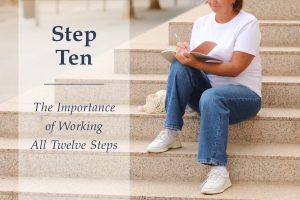I am a member of Overeaters Anonymous. I’ve broken my anonymity by saying this to certain people, but in a private setting, it’s okay if I break it myself, not if someone else does. I’ve also made more public mention of “my support group” without saying what it is exactly or what it supports.
In 1988, I “came into program,” as we call it, weighing 280 pounds (127 kg) or more (by then I’d stopped weighing myself). I’d first read about OA in a popular advice column, and I wrote down the phone number in a tiny phone book that I kept in my purse—this was way before computers and the internet. When that tiny phone book wore out, I transcribed the numbers to a second book, but I did not call OA.
Instead, following one of my incredibly awful binges, as I was feeling sick as a dog and crying because I wanted to stop eating but couldn’t, I called my third ex-husband. He had gotten clean and sober in another Twelve Step program, and I had experienced his before and after. I begged him to take me to a meeting. I didn’t care what kind of meeting it was, because at that point, I had hit bottom.
He took me to a meeting for his fellowship, and all I remember is that it was on a beach with a huge bonfire going and that I felt safe and at home being in the company of other people who were dealing with addiction. That meeting opened the door of recovery for me. My drug of choice was food, so I knew I had to get to OA.
My drug of choice was food, so I knew I had to get to OA.
Attending OA meetings in Hollywood, I harshly judged the size-zero women there. They spoke of their seemingly petty problems, and I felt they didn’t really know suffering. Resentful as I was about this, I was also desperate for help. A nice young man gave me a copy of the Big Book. (Tattered and frayed all these many years later, I still cherish that book.) I kept coming back to the meetings and listening. Though I don’t remember much about those first eight years, I know I must have worked the Steps, which means incorporating the Principles of the Twelve Steps into my life; I must have gotten a sponsor, because you can’t work the program alone; and I lost 120 pounds (54 kg).
After eight years in program, I left, thinking I had graduated and could maintain the weight loss on my own. Was I wrong. Out there on my own for five years, 60 pounds (27 kg) slowly crept back. What took me to the brink in the final years of relapse was craft services, the requisite catering services provided during film and television productions. Often I would go to the set with my actor husband and hang out all day, and craft services was the devil. Originally, it provided mealtime sustenance for the hardworking production crews, but it has evolved to offer hot foods and snacks for everyone throughout the day and all into the night, if necessary. And when I say snacks, I mean all of my favorite salty crunchies, sweets, candies, you name it (and my mouth waters even as I write this). Whenever I mention craft services in meetings, there are moans and sighs of recognition because this is a film and television industry town, after all.
I returned to OA twenty-three years ago, and even though my weight has been up and down, I have stayed in program where it’s safe for me. During the last year and a half, I strengthened my program, relying more on faith in a Higher Power who I call God, and my weight has returned to a normal range.
During the last year and a half, I strengthened my program, relying more on faith in a Higher Power who I call God, and my weight has returned to a normal range.
I’ve heard many people in OA say they have struggled with weight and food from childhood. I suppose I was fortunate that my weight problem didn’t show up on my body until my late twenties, which saved me from the slings and arrows of girlhood and teenage teasing and angst. However, once the disease set in, it was on and crackalackin’. It began in earnest when I was pregnant with my son at age 26. Excited to officially eat for two, I went into the food like my life depended on it. At work, I kept a big box of cereal in my bottom desk drawer. Rarely working, I spent the majority of my days in the sick room where there was a conveniently located cot, blanket, and pillow. I napped, had someone come wake me at break time, worked a bit, then went to lunch, and then I repeated the routine in the afternoon.
My pediatrician’s stinging bedside manner did nothing to deter my overeating. During one visit he told me, “Oh, you weigh as much as a quarterback.” It hurt to hear this, and I ate the pain away.
As my relationship with my son’s father deteriorated, I devoured fast food in the car before going home to have dinner with him, discarding the evidence along the way. When the baby was born I was shocked to find my old clothes no longer fit. Maternity clothes had to do.
Soon I was divorced, and the myriad of emotions accompanying that transition kept me running to the food. Slowly my weight inched up. Slowly my son grew up. For his sixth birthday, I brought a cake to his classroom. With my back to the room, I cut the cake for the celebration. As I did so, one of his classmates loudly whispered, “Your mommy is fat!” Their childish giggles cut me to the quick.The heat of embarrassment warmed my face and fat body. I turned around, smiled, and pretended I hadn’t heard. At home that evening, I ate more.
Three years later, my son’s father and his new wife moved to another city, which caused my son’s behavior to change. He missed his father and started acting out. I was desperately grasping for a quick solution, so we decided he would live with his father permanently. I mishandled this life-changing decision, which left me with the lingering odor of regret.
For twelve long years I lived single, lonely, and depressed—emotions I could not name at the time. I was alone with my best friend and abuser, food. It tamped down my guilt over sending away my son. With no witnesses to my debauchery, I’d go to work, and on the way home, stop at a different convenience store each day because I didn’t want the clerks to think I was having a party every day (as if they cared). I’d get home, gather my binge foods in front of the television, chow down until everything was gone, go to sleep, and start all over the next day. That was my sad life, cycling between salty crunchies and sweets.
Today, I don’t have to live that awful way anymore. I have learned a new way to live. Support from my OA fellows comforts my soul, and I can always count on someone in program to talk me down if the food starts talking too loudly to me. I’ve learned there is no graduating from OA, just continual self-discovery, and I am grateful for it.
The journey is different for everyone; this is how it was for me. I don’t represent OA, but I am and always will be an OA member. I am not ever leaving this miraculous program. It saved my life by improving my relationships with food, people, my husband in particular, God and myself.
—Denise B., California USA





